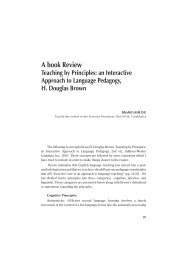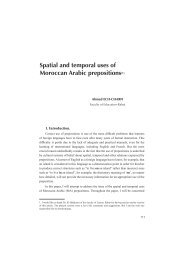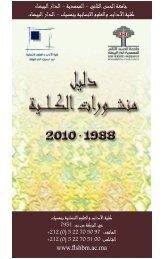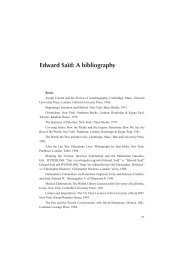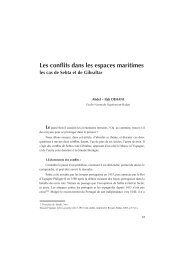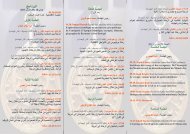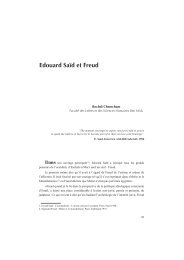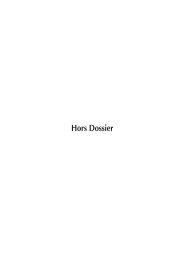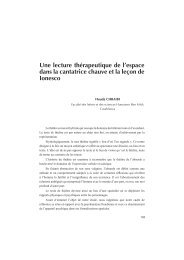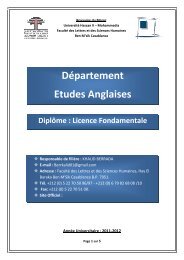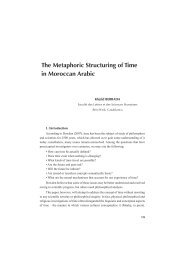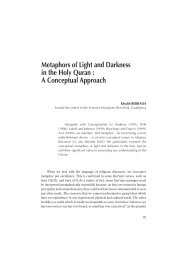Reflections on Exile, Edward Said and the
Reflections on Exile, Edward Said and the
Reflections on Exile, Edward Said and the
Create successful ePaper yourself
Turn your PDF publications into a flip-book with our unique Google optimized e-Paper software.
Basamat12
<str<strong>on</strong>g>Reflecti<strong>on</strong>s</str<strong>on</strong>g> <strong>on</strong> <strong>Exile</strong>, <strong>Edward</strong> <strong>Said</strong> <strong>and</strong> <strong>the</strong> “Mainstreaming” of Postcol<strong>on</strong>ial Literary ThoughtKnowledge, Power <strong>and</strong> Fear:<str<strong>on</strong>g>Reflecti<strong>on</strong>s</str<strong>on</strong>g> <strong>on</strong> <strong>Exile</strong>, <strong>Edward</strong> <strong>Said</strong> <strong>and</strong><strong>the</strong> “Mainstreaming” of Postcol<strong>on</strong>ialLiterary Thought (1)Valérie Orl<strong>and</strong>o“The moment you begin to aspire, not just to talk to power,to speak <strong>the</strong> truth to it, but to try to become part of it, <strong>the</strong>n you lose your bearings”.E. <strong>Said</strong>, Interview with Bill Ashcroft, 1996The 20th-21st Century French <strong>and</strong> Francoph<strong>on</strong>e Studies Internati<strong>on</strong>al Colloquiumheld in 2004 brought toge<strong>the</strong>r scholars from <strong>the</strong> four corners of <strong>the</strong> globe to discuss<strong>the</strong> <strong>the</strong>me “Diversity <strong>and</strong> Difference in France <strong>and</strong> <strong>the</strong> Francoph<strong>on</strong>e World.” During <strong>the</strong>c<strong>on</strong>ference, pressing issues c<strong>on</strong>cerning <strong>the</strong> fate of <strong>the</strong> Humanities, French Studies <strong>and</strong>,in general, <strong>the</strong> well-being <strong>and</strong> vitality of French departments were topics of debate (2) .One of <strong>the</strong> most well attended sessi<strong>on</strong>s, entitled “<strong>Edward</strong> <strong>Said</strong> (1935-2003): Legacies forFrench <strong>and</strong> Francoph<strong>on</strong>e Studies,” was dedicated to discussing <strong>Said</strong>’s impact in particular<strong>on</strong> French Studies <strong>and</strong>, more generally, <strong>on</strong> university Humanities programs (3) . What was1. The author would like to thank Illinois Wesleyan University’s Faculty Development Grant committeewhich awarded funds in <strong>the</strong> form of an Artistic <strong>and</strong> Scholarly Development grant for <strong>the</strong> research of thisarticle, Spring 2004.2. The c<strong>on</strong>ference was held at <strong>the</strong> Winthrop-King Institute for C<strong>on</strong>temporary French <strong>and</strong> Francoph<strong>on</strong>eStudies, Florida State University, Tallahassee, April 1-3, 2004.3. “<strong>Edward</strong> <strong>Said</strong> (1935-2003): Legacies for French <strong>and</strong> Francoph<strong>on</strong>e Studies.” The chair of <strong>the</strong> sessi<strong>on</strong>,Paniv<strong>on</strong>g Norindr (USC), brought toge<strong>the</strong>r five prominent scholars for an open panel discussi<strong>on</strong>. Thesescholars included: Peter Bloom, (UC Santa Barbara), Charles Forsdick (U of Liverpool, UK), CilasKemedjo (U of Rochester), David Murphy (U of Sterling, UK), <strong>and</strong> Jane Winst<strong>on</strong> (Northwestern U). Thisround table discussi<strong>on</strong> was held <strong>on</strong> April 3, 2004.13
Basamatmost significant for me, <strong>and</strong> attests to <strong>the</strong> importance of <strong>Said</strong>’s legacy, was <strong>the</strong> fact that<strong>the</strong> panel represented exactly what French departments (<strong>and</strong> o<strong>the</strong>r disciplines across <strong>the</strong>Humanities) have become because of thirty years of <strong>Said</strong>ian influence. Our present dayc<strong>on</strong>cepti<strong>on</strong> of <strong>the</strong> Humanities has been shaped by a <strong>Said</strong>ian oeuvre that begun with his1975 book Beginnings, in which he dedicated himself to exploring <strong>the</strong> c<strong>on</strong>necti<strong>on</strong> between“history <strong>and</strong> [<strong>the</strong>] coherence of social reality” (19). The members of <strong>the</strong> panel of speakersrepresented Film Studies, Women’s Studies, Postcol<strong>on</strong>ial Studies <strong>and</strong> Literary Theory (4) .These disciplines are now generally housed under <strong>the</strong> auspices of any viable French orEnglish department, or are c<strong>on</strong>nected to <strong>the</strong>m through interdisciplinary links that havefostered “multifaceted” tenure lines (i.e. <strong>the</strong> tenure-track hire who teaches courses inFrench <strong>and</strong> also Women’s Studies). Looking around <strong>the</strong> room at colleagues, old <strong>and</strong>young, I determined that <strong>Said</strong>’s influence has not <strong>on</strong>ly transformed <strong>the</strong> French can<strong>on</strong>, ithas also given birth to “<strong>the</strong> multi-ethnic globalist establishment” we know as <strong>the</strong> postmodern/post-col<strong>on</strong>ialc<strong>on</strong>temporary American University. Educati<strong>on</strong> is now defined by,as well as has fostered, a countrywide “multi-culturalism” that has permeated mainstreamsociety in America; our art, culture, media <strong>and</strong> politics (Dirlik 286).However, <strong>Said</strong>’s work <strong>and</strong> that of later <strong>Said</strong>ian influenced scholars have also taughtus that multiculturalism <strong>and</strong> <strong>the</strong> dissoluti<strong>on</strong> of can<strong>on</strong>ical modes of thought have notcome without a price. This fact has been aptly noted in Charles Taylor’s volume entitledMulticulturalism in which Amy Gutman states in <strong>the</strong> preface: “Accompanying... pluralism[<strong>and</strong> ideas about multiculturalism] is a widespread skepticism about <strong>the</strong> defensibility ofany moral principles or perspectives” (XIII). Multiculturalism <strong>and</strong> pluralistic ideologiesentreat a plethora of ethical questi<strong>on</strong>s that any diverse community must face: “Theethical issues of our time pose a challenge to any university committed to an educati<strong>on</strong>almissi<strong>on</strong> that encompasses more than <strong>the</strong> development <strong>and</strong> disseminati<strong>on</strong> of empiricalknowledge.... Can people who differ in <strong>the</strong>ir moral perspectives n<strong>on</strong>e<strong>the</strong>less reas<strong>on</strong>toge<strong>the</strong>r in ways that are productive of greater ethical underst<strong>and</strong>ing?” (XIII) Althoughgreater underst<strong>and</strong>ing is <strong>the</strong> result of multicultural communities, <strong>the</strong> mainstreaming ofpostcol<strong>on</strong>ial thought <strong>and</strong> multiethnic studies has often fostered what <strong>Edward</strong> <strong>Said</strong> definesas a “clash of cultures.” In <str<strong>on</strong>g>Reflecti<strong>on</strong>s</str<strong>on</strong>g> <strong>on</strong> <strong>Exile</strong> he writes:[F]ar bey<strong>on</strong>d <strong>the</strong> boundaries imposed by language <strong>and</strong> nati<strong>on</strong>....[in]comparative literatures <strong>the</strong>re is an epistemological commitment to <strong>the</strong>relati<strong>on</strong>ships between literatures, to <strong>the</strong>ir rec<strong>on</strong>ciliati<strong>on</strong> <strong>and</strong> harm<strong>on</strong>y,despite <strong>the</strong> existence of powerful ideological <strong>and</strong> nati<strong>on</strong>al barriersbetween <strong>the</strong>m. And this sort of cooperative, collective enterprise is what<strong>on</strong>e misses in <strong>the</strong> proclaimers of an undying clash between cultures: <strong>the</strong>lifel<strong>on</strong>g dedicati<strong>on</strong> that has existed in all modern societies am<strong>on</strong>g scholars,4. Panel: “<strong>Edward</strong> <strong>Said</strong> (1935-2003): Legacies for French <strong>and</strong> Francoph<strong>on</strong>e Studies,” Round Tablediscussi<strong>on</strong>.14
<str<strong>on</strong>g>Reflecti<strong>on</strong>s</str<strong>on</strong>g> <strong>on</strong> <strong>Exile</strong>, <strong>Edward</strong> <strong>Said</strong> <strong>and</strong> <strong>the</strong> “Mainstreaming” of Postcol<strong>on</strong>ial Literary Thoughtartists, musicians, visi<strong>on</strong>aries, <strong>and</strong> prophets to try to come to terms with<strong>the</strong> O<strong>the</strong>r, with that o<strong>the</strong>r society or culture that seems so foreign <strong>and</strong> sodistant (<str<strong>on</strong>g>Reflecti<strong>on</strong>s</str<strong>on</strong>g> 583).<strong>Said</strong>’s c<strong>on</strong>tributi<strong>on</strong> to n<strong>on</strong>-can<strong>on</strong>ical thought has been n<strong>on</strong>-paralleled in postcol<strong>on</strong>ialstudies. Academics in <strong>the</strong> Humanities would agree that he is <strong>the</strong> fa<strong>the</strong>r of “<strong>the</strong> movement.”The very discourse of postcol<strong>on</strong>iality is counter-hegem<strong>on</strong>ic as scholar C. Vijayasreec<strong>on</strong>tends: “[<strong>Said</strong>’s] postcol<strong>on</strong>ial discourse is primarily a counter-discourse not <strong>on</strong>ly becauseits <strong>the</strong>matic c<strong>on</strong>cerns register a violent protest against <strong>the</strong> structures of hegem<strong>on</strong>y, but alsobecause its formal <strong>and</strong> structural c<strong>on</strong>figurati<strong>on</strong>s <strong>and</strong> linguistic innovati<strong>on</strong>s questi<strong>on</strong>, subvert<strong>and</strong> undermine <strong>the</strong> basic assumpti<strong>on</strong>s of ‘mainstream’ critical <strong>the</strong>ories” (107). Fur<strong>the</strong>r, <strong>Said</strong>’sphilosophy of secular criticism has also aided in breaking <strong>the</strong> chains of literary can<strong>on</strong>s inEnglish <strong>and</strong> French because it “vehemently opposes <strong>the</strong> totalitarianism implied in....Eurocentricmodels of cultural/ec<strong>on</strong>omic producti<strong>on</strong>” (Vijayasree 108). Therefore, <strong>Said</strong>’s legacyis felt not <strong>on</strong>ly within <strong>the</strong> c<strong>on</strong>fines of literary criticism across <strong>the</strong> Humanities, he also hasinfluenced <strong>the</strong> very nature of cultural thinking outside <strong>the</strong> walls of academia. In <strong>the</strong> caseof French Studies, <strong>Said</strong>’s legacy has totally transformed <strong>the</strong> discipline. Recently publishedworks such as Tyler Stovall <strong>and</strong> Georges Van den Abbeele’s French Civilizati<strong>on</strong> <strong>and</strong> ItsDisc<strong>on</strong>tents: Nati<strong>on</strong>alism, Col<strong>on</strong>ialism, Race analyzes <strong>the</strong> disseminati<strong>on</strong> of <strong>the</strong> Frenchlanguage into <strong>the</strong> multicultural domain. For <strong>the</strong> editors of this volume of collected works<strong>on</strong> various aspects of French studies by numerous academics in <strong>the</strong> field of French studies,“French.... [has achieved] universalist aspirati<strong>on</strong>s but <strong>on</strong>ly at <strong>the</strong> cost of its becomingsomething very o<strong>the</strong>r than <strong>the</strong> preserved <strong>and</strong> c<strong>on</strong>trolled language of <strong>the</strong> Académie française[it has become] something much more protean, changeable, <strong>and</strong> diverse, something able tocross linguistic <strong>and</strong> cultural boundaries precisely because of its ability to assimilate an everincreasingdiversity of speakers” (9). Within <strong>the</strong> realm of postcol<strong>on</strong>ial studies, Stovall <strong>and</strong>Van den Abbeele’s study dem<strong>on</strong>strates that French language <strong>and</strong> literature have transgressednati<strong>on</strong>al boundaries to include <strong>the</strong> multifaceted francoph<strong>on</strong>e diaspora, bringing toge<strong>the</strong>rdiverse regi<strong>on</strong>s from <strong>the</strong> four corners of <strong>the</strong> globe.C<strong>on</strong>trarily, just as we have been streng<strong>the</strong>ned by postcol<strong>on</strong>ial <strong>the</strong>ory in French<strong>and</strong> elsewhere across <strong>the</strong> disciplines of <strong>the</strong> Humanities, <strong>and</strong> even though <strong>the</strong>re is moreequitable exchange within <strong>the</strong> study of can<strong>on</strong>ical <strong>and</strong> diasporic literatures because of<strong>Said</strong>’s legacy of “ re-writing of <strong>the</strong> past” (Dirlik 287), we also are increasingly c<strong>on</strong>fr<strong>on</strong>tedwith a c<strong>on</strong>servative, right-wing backlash against <strong>the</strong> tenants of postcol<strong>on</strong>ial study.Multiculturalism has proved to be problematic for Western societies outside <strong>the</strong> wallsof academia. Why? Because when homogenous societies are c<strong>on</strong>fr<strong>on</strong>ted with O<strong>the</strong>rness,just as <strong>Said</strong> predicted, <strong>the</strong>se societies feel threatened by <strong>the</strong> perceived “danger of beinglost” (Taylor 30).Today, anti-<strong>Said</strong> rhetoric is propagated <strong>on</strong> two fr<strong>on</strong>ts. First, by those within <strong>the</strong>academy who abhor what is viewed as <strong>the</strong> dissoluti<strong>on</strong> of <strong>the</strong> pureté of French departments15
Basamat(<strong>and</strong> any o<strong>the</strong>r discipline for that matter–English, German, Psychology– that has beendeemed “tainted” by multiculturalism). Sec<strong>on</strong>d, our multi-faceted academy in <strong>the</strong> UnitedStates is now under fire by <strong>the</strong> more insidious, external c<strong>on</strong>servative-Christian-Republicanfr<strong>on</strong>t which has, since George W. Bush took office in 2000, succeeded in gagging freedomof speech <strong>on</strong> university campuses <strong>and</strong> threatening interdisciplinary scholarship dealingwith topics determined to be menacing to <strong>the</strong> security of <strong>the</strong> United States.This article explores how <strong>Edward</strong> <strong>Said</strong>’s seminal works, most particularly hisearly works The Text, <strong>the</strong> World <strong>and</strong> <strong>the</strong> Critic <strong>and</strong> Orientalism followed by <strong>the</strong> later<str<strong>on</strong>g>Reflecti<strong>on</strong>s</str<strong>on</strong>g> <strong>on</strong> <strong>Exile</strong>, have influenced entrenched views that promoted can<strong>on</strong>ical programsof literary study in higher educati<strong>on</strong> <strong>and</strong> externally in mainstream politics. In 1978 whenOrientalism was first published, literary <strong>the</strong>ory was transformed forever. <strong>Edward</strong> <strong>Said</strong>boldly exposed “traditi<strong>on</strong>al Western hostility to <strong>and</strong> fear of <strong>the</strong> Orient” which had fueledpolitical policies as well as cultivated a whole way of writing in <strong>the</strong> Anglo-Europeanworld for centuries (Orientalism 237). Suddenly, great works of <strong>the</strong> Anglo-Europeancan<strong>on</strong> by Lawrence, C<strong>on</strong>rad, Hugo, Gide, Flaubert <strong>and</strong> o<strong>the</strong>rs were scrutinized through anew, untraditi<strong>on</strong>al (some would say “threatening”) <strong>the</strong>oretical lens. For <strong>the</strong> first time, anacademic scholar asked how can we “study o<strong>the</strong>r cultures <strong>and</strong> peoples from a libertarian,or a n<strong>on</strong>repressive <strong>and</strong> n<strong>on</strong>manipulative, perspective”? (24) Although in <str<strong>on</strong>g>Reflecti<strong>on</strong>s</str<strong>on</strong>g> <strong>on</strong><strong>Exile</strong> <strong>Said</strong> claims not to have totally achieved his task in Orientalism, he brought to <strong>the</strong>forefr<strong>on</strong>t <strong>on</strong>e very important point that remained <strong>the</strong> driving force of his work for <strong>the</strong> nexttwenty-five years: rethinking how we analyze literature means we also have to rethink“<strong>the</strong> whole complex problem of knowledge <strong>and</strong> power” (Orientalism 24). In <strong>the</strong> words ofFoucault, who was a resounding influence <strong>on</strong> <strong>Said</strong>: “Power <strong>and</strong> knowledge directly imply<strong>on</strong>e ano<strong>the</strong>r” (Foucault 27).In <str<strong>on</strong>g>Reflecti<strong>on</strong>s</str<strong>on</strong>g> <strong>on</strong> <strong>Exile</strong>, <strong>on</strong>e of his last works, <strong>Edward</strong> <strong>Said</strong> offers a retrospectiveanalysis <strong>on</strong> his many years of academic writing, research, <strong>and</strong> public intellectualism.In this often humble self-assessment in which he characterizes his rise to fame as “anattempt to impose a narrative <strong>on</strong> a life that I [have] left more or less to itself, disorganized,scattered, uncentered” (<str<strong>on</strong>g>Reflecti<strong>on</strong>s</str<strong>on</strong>g> 556), not <strong>on</strong>ly does <strong>Said</strong> p<strong>on</strong>der his own paths to anotable career in American academia, he also reflects up<strong>on</strong> <strong>the</strong> shaping of <strong>the</strong> post-col<strong>on</strong>ialnarrative <strong>and</strong> <strong>the</strong> academic <strong>the</strong>ory <strong>and</strong> criticism that it engendered. <strong>Said</strong> is perhaps <strong>the</strong>most influential pundit (although he most assuredly would have denied it) of postcol<strong>on</strong>ialliterary studies <strong>and</strong> is largely resp<strong>on</strong>sible for its slow assimilati<strong>on</strong> into literature programsin both French <strong>and</strong> English departments within <strong>the</strong> American academy.In <str<strong>on</strong>g>Reflecti<strong>on</strong>s</str<strong>on</strong>g> <strong>on</strong> <strong>Exile</strong>, <strong>Said</strong> analyzes <strong>the</strong> rise in popularity of postcol<strong>on</strong>ial literature<strong>and</strong> his own unflagging efforts over <strong>the</strong> years to rendering “acceptable” n<strong>on</strong>-can<strong>on</strong>icalworks of literature within academic departments in Anglo-American instituti<strong>on</strong>s. Indeed,<strong>the</strong> merger of <strong>the</strong> O<strong>the</strong>r with Us is at <strong>the</strong> heart of much of <strong>Said</strong>’s work. In <str<strong>on</strong>g>Reflecti<strong>on</strong>s</str<strong>on</strong>g> <strong>on</strong><strong>Exile</strong>, his autobiographical accounts meld with his studies of ficti<strong>on</strong>. Reflecting up<strong>on</strong>16
<str<strong>on</strong>g>Reflecti<strong>on</strong>s</str<strong>on</strong>g> <strong>on</strong> <strong>Exile</strong>, <strong>Edward</strong> <strong>Said</strong> <strong>and</strong> <strong>the</strong> “Mainstreaming” of Postcol<strong>on</strong>ial Literary Thought<strong>the</strong> school years of his youth endured in <strong>the</strong> British school system, <strong>Said</strong> notes that “<strong>the</strong>line separating Us from Them was linguistic, cultural, racial, <strong>and</strong> ethnic” <strong>and</strong> that hiseventual underst<strong>and</strong>ing of <strong>the</strong> “O<strong>the</strong>r” (in his case British classmates), meant a clearerunderst<strong>and</strong>ing of himself (558). Clearer underst<strong>and</strong>ing of <strong>the</strong> Us/O<strong>the</strong>r dialectic is nowan ideology eagerly employed by most professors of postcol<strong>on</strong>ial literary study in <strong>the</strong>American academy. We have, for <strong>the</strong> most part, embraced <strong>the</strong> idea that “equal dignity isbased <strong>on</strong> <strong>the</strong> idea that all humans are equally worthy of respect” (Taylor 41).<strong>Said</strong>’s self-reflecti<strong>on</strong> <strong>on</strong> his own o<strong>the</strong>rness set in moti<strong>on</strong> an entire body of writingdedicated to refracting <strong>the</strong> gaze of <strong>the</strong> West with all its exotified mythology, rooted inan early col<strong>on</strong>ial fascinati<strong>on</strong> with foreign “eastern/Arab/O<strong>the</strong>r” l<strong>and</strong>s. Today, thanks tothis introspecti<strong>on</strong> <strong>and</strong> a lifetime of dedicati<strong>on</strong> to literature, authors’ voices from around<strong>the</strong> world such as that of V.S. Naipaul, Nawal el-Saadawi, Edwidge Danticat, MalikaMokeddem, M<strong>on</strong>go Beti, to name just a few, reverberate within academic literaturecourses as much as <strong>the</strong> writing of C<strong>on</strong>rad or Hemingway. Where <strong>on</strong>ce “Third WorldLiteratures” were viewed as lesser or not as good as that produced by <strong>the</strong> West, today <strong>the</strong>seO<strong>the</strong>rs are included <strong>on</strong> every American university’s reading list. <strong>Edward</strong> <strong>Said</strong> has taughtus that “minor,” (marginalized) literature could indeed move into <strong>the</strong> “main”/can<strong>on</strong>icalstream.<strong>Said</strong> helped <strong>the</strong> literary world see, as French philosophers Gilles Deleuze <strong>and</strong>Félix Guattari maintain in <strong>the</strong>ir pivotal work, Kafka: Toward a Minor Literature, that“[m]inor literature is completely different; its cramped space forces each individualintrigue to c<strong>on</strong>nect immediately to politics. The individual c<strong>on</strong>cern thus becomes all <strong>the</strong>more necessary, indispensable, magnified, because a whole o<strong>the</strong>r story is vibrating withinit. In this way, <strong>the</strong> family triangle c<strong>on</strong>nects to o<strong>the</strong>r triangles–commercial, ec<strong>on</strong>omic,bureaucratic, juridical–that determine its values...[a] characteristic of minor literature isthat in it everything takes <strong>on</strong> a collective value” (Deleuze, Guattari 17).Today, establishing c<strong>on</strong>necti<strong>on</strong>s between western-can<strong>on</strong>ical <strong>and</strong> n<strong>on</strong>-western-O<strong>the</strong>rhas become customary, certainly in <strong>the</strong> American academy. For example, no viable Frenchprogram exists without a Francoph<strong>on</strong>e literatures comp<strong>on</strong>ent, fostering <strong>the</strong> study ofliterature written in French produced by writers from <strong>the</strong> Francoph<strong>on</strong>e African, Caribbean,Asian <strong>and</strong> North American diasporas. <strong>Said</strong> moved us from <strong>the</strong> col<strong>on</strong>iality of <strong>on</strong>e-sided,hed<strong>on</strong>istic-centered readings of traditi<strong>on</strong>al, white-Anglo-Sax<strong>on</strong> texts to <strong>the</strong> “c<strong>on</strong>nectedtriangles” that are <strong>the</strong> works of <strong>the</strong> multi-faceted O<strong>the</strong>r. He promotes “<strong>the</strong> c<strong>on</strong>necti<strong>on</strong>s[that] emerge from <strong>the</strong>ir explicit places in ... various texts, with <strong>the</strong> enveloping setting,empire, <strong>the</strong>re to make c<strong>on</strong>necti<strong>on</strong>s with, to develop, elaborate, exp<strong>and</strong>, or criticize”(<strong>Said</strong>’s Culture <strong>and</strong> Imperialism [14] as qtd. in Hildreth 70). Diasporic literatures promote<strong>the</strong> importance of n<strong>on</strong>-western languages <strong>and</strong> differing, appositi<strong>on</strong>al views filled withn<strong>on</strong>-Western meanings. <strong>Said</strong> shaped our professi<strong>on</strong> - <strong>the</strong> world of c<strong>on</strong>temporary literaryscholars <strong>and</strong> <strong>the</strong>orists - by exposing <strong>the</strong> importance of looking at literature, our own <strong>and</strong>that of o<strong>the</strong>rs, from all angles. Yet, at <strong>the</strong> same time, he states, <strong>the</strong>se multi-angles havecaused turbulence in <strong>the</strong> American academy.17
Basamat[I]n <strong>the</strong> United States many college campuses have been shakenduring <strong>the</strong> past couple of decades over what <strong>the</strong> can<strong>on</strong> of Western civilizati<strong>on</strong>is, which books should be taught, which <strong>on</strong>es read or not read, included,or o<strong>the</strong>rwise given attenti<strong>on</strong>. Places like Stanford <strong>and</strong> Columbia debated<strong>the</strong> issue not simply because it was a matter of habitual academic c<strong>on</strong>cernbut because <strong>the</strong> definiti<strong>on</strong> of <strong>the</strong> West <strong>and</strong> c<strong>on</strong>sequently of America was atstake. (<str<strong>on</strong>g>Reflecti<strong>on</strong>s</str<strong>on</strong>g> 577)Such statements have not <strong>on</strong>ly uprooted <strong>the</strong> structure of departments in <strong>the</strong>Humanities, but also <strong>the</strong> functi<strong>on</strong> of higher educati<strong>on</strong> in American society. Nowthat “minor literatures” are no l<strong>on</strong>ger minor, or at least less so, what happens to <strong>the</strong>mainstream? Where do we go from here in literary study <strong>and</strong> multicultural thought? In<strong>the</strong> closing pages of <str<strong>on</strong>g>Reflecti<strong>on</strong>s</str<strong>on</strong>g>, <strong>Said</strong> himself w<strong>on</strong>ders what will be <strong>the</strong> outcome of <strong>the</strong>multiple c<strong>on</strong>necti<strong>on</strong>s we have made in our attempts to codify a new global view of <strong>the</strong>world. (5) One could argue that <strong>Said</strong>’s political views transit so easily to literature programsbecause <strong>the</strong>y strive to discover “sentiments [that] prepare <strong>the</strong> way for a dissoluti<strong>on</strong> ofcultural barriers” (<str<strong>on</strong>g>Reflecti<strong>on</strong>s</str<strong>on</strong>g> 590). Yet, at <strong>the</strong> same time, dissoluti<strong>on</strong>s of cultural barriers<strong>and</strong> can<strong>on</strong>ical modes of thought in <strong>the</strong> academy will, if we are not vigilant, lead tomiscomprehensi<strong>on</strong> <strong>and</strong> “misrecogniti<strong>on</strong>” outside <strong>the</strong> Ivory Tower. Like <strong>Said</strong>, CharlesTaylor warns that “n<strong>on</strong>recogniti<strong>on</strong> or misrecogniti<strong>on</strong> can inflict harm, can be a formof oppressi<strong>on</strong>, impris<strong>on</strong>ing some<strong>on</strong>e in a false, distorted, <strong>and</strong> reduced mode of being”(25). Sadly, dissoluti<strong>on</strong> of cultural barriers <strong>and</strong> <strong>the</strong>ir often misrecogniti<strong>on</strong> have led someacademics to believe that <strong>the</strong>y are now ghettoized within <strong>the</strong> academy. Certain universityprofessors in <strong>the</strong> Humanities <strong>and</strong> Social Sciences now feel united in <strong>the</strong>ir dedicati<strong>on</strong>to multiculturalism, yet also stratified into disciplinary camps trying to hold <strong>on</strong>to <strong>the</strong>irrespective turfs. In <strong>the</strong> last chapter of <str<strong>on</strong>g>Reflecti<strong>on</strong>s</str<strong>on</strong>g>, entitled “The Clash of Definiti<strong>on</strong>s,” <strong>Said</strong>cogently exposes some of <strong>the</strong> pressing questi<strong>on</strong>s facing academics in <strong>the</strong> Humanities. Howto dismantle cultural barriers, yet keep some discipline specific integrity is <strong>the</strong> issue nowfacing professors: “In both <strong>the</strong> col<strong>on</strong>ial <strong>and</strong> <strong>the</strong> post-col<strong>on</strong>ial c<strong>on</strong>text...rhetorics of generalcultural or civilizati<strong>on</strong>al specificity went in two potential directi<strong>on</strong>s, <strong>on</strong>e a utopian linethat insisted <strong>on</strong> an overall pattern of integrati<strong>on</strong> <strong>and</strong> harm<strong>on</strong>y am<strong>on</strong>g all peoples, <strong>the</strong> o<strong>the</strong>ra line which suggested that all civilizati<strong>on</strong>s were so specific <strong>and</strong> jealous, m<strong>on</strong>o<strong>the</strong>istic, ineffect, as to reject <strong>and</strong> war against all o<strong>the</strong>rs” (<str<strong>on</strong>g>Reflecti<strong>on</strong>s</str<strong>on</strong>g> 586).5. Particularly interesting is <strong>Said</strong>’s work The World, <strong>the</strong> Text, <strong>and</strong> <strong>the</strong> Critic (Cambridge: Harvard UP,1983) in which he explains how English departments were radically altered due to “internal <strong>and</strong> externalchallenges” in <strong>the</strong> 1960s. These included, <strong>on</strong> <strong>the</strong> “internal” fr<strong>on</strong>t, New Criticism, <strong>the</strong> Frankfurt School, <strong>and</strong>new Marxism. On <strong>the</strong> “external” fr<strong>on</strong>t, <strong>the</strong> Vietnam war <strong>and</strong> its ensuing protests <strong>on</strong> campuses across <strong>the</strong>country melded politics, literary <strong>the</strong>ory <strong>and</strong> basically moved literary studies from <strong>the</strong> Ivory Tower to <strong>the</strong>streets (166).18
<str<strong>on</strong>g>Reflecti<strong>on</strong>s</str<strong>on</strong>g> <strong>on</strong> <strong>Exile</strong>, <strong>Edward</strong> <strong>Said</strong> <strong>and</strong> <strong>the</strong> “Mainstreaming” of Postcol<strong>on</strong>ial Literary ThoughtOur own fear over <strong>the</strong> dissoluti<strong>on</strong> of disciplinary integrity has also generated debateoutside <strong>the</strong> academy. <strong>Said</strong> incessantly warned us up to <strong>the</strong> time of his death that if wedid not explain what multiculturalism is <strong>and</strong> does, it would be misinterpreted by politics<strong>and</strong> <strong>the</strong> wielders of power <strong>and</strong>, in turn, be co-opted by a chaotic “globalism” rooted infear. Fear, explains <strong>Said</strong>, results from <strong>the</strong> realizati<strong>on</strong> that <strong>the</strong> potential of cultural dishomogenizati<strong>on</strong>/dissoluti<strong>on</strong>exists: “One of <strong>the</strong> major crises affecting countries likeFrance, Britain, <strong>and</strong> <strong>the</strong> United States has been brought about by <strong>the</strong> realizati<strong>on</strong> nowdawning everywhere that no culture or society is purely <strong>on</strong>e thing. Sizeable minorities- North Africans in France, <strong>the</strong> African <strong>and</strong> African elements in <strong>the</strong> United States - dispute<strong>the</strong> idea that civilizati<strong>on</strong>s that prided <strong>the</strong>mselves <strong>on</strong> being homogenous can c<strong>on</strong>tinue todo so. There are no insulated cultures or civilizati<strong>on</strong>s” (<str<strong>on</strong>g>Reflecti<strong>on</strong>s</str<strong>on</strong>g> 587). In recent years,this fear has caused a backlash against n<strong>on</strong>-Western societies, cultures <strong>and</strong> histories. Asif predicting <strong>the</strong> cultural backlash aftermath of 9/11, <strong>Said</strong> maintained that if Western fearis left unchecked, it will manifest into “a clash of civilizati<strong>on</strong>s” (taken from Samuel P.Huntingt<strong>on</strong>’s essay of <strong>the</strong> same title) <strong>and</strong> will risk undoing <strong>the</strong> positive literary, political,<strong>and</strong> cultural meanings that scholars, intellectuals, <strong>and</strong> human rights activists have soughtto define for years, both within <strong>and</strong> outside <strong>the</strong> Ivory Tower. (6) As I write this during <strong>the</strong>darkest m<strong>on</strong>ths of <strong>the</strong> American war in Iraq, I can <strong>on</strong>ly speculate <strong>on</strong> how <strong>Said</strong> would,yet again, rec<strong>on</strong>textualize his <strong>the</strong>ory <strong>on</strong> <strong>the</strong> Fear of <strong>the</strong> O<strong>the</strong>r <strong>and</strong> how this fear can, <strong>and</strong>always will, become <strong>the</strong> driving factor of c<strong>on</strong>quest, genocide <strong>and</strong> war “increasing <strong>the</strong> riftsbetween peoples in order to prol<strong>on</strong>g our dominance” (<str<strong>on</strong>g>Reflecti<strong>on</strong>s</str<strong>on</strong>g> 589).The fact that <strong>Edward</strong> <strong>Said</strong> changed <strong>the</strong> face of <strong>the</strong> American academy <strong>and</strong> certainly<strong>the</strong> can<strong>on</strong>ical structures of literature departments, both French <strong>and</strong> English, has beena primary focal point of discussi<strong>on</strong> since his death. Indeed, <strong>Said</strong>’s legacy of change isnow heatedly debated both in <strong>and</strong> outside <strong>the</strong> American Academy. In April 2004, <strong>on</strong>eof <strong>the</strong> most pressing issues brought up at <strong>the</strong> panel <strong>on</strong> <strong>Said</strong> at <strong>the</strong> 20th-21st French <strong>and</strong>Francoph<strong>on</strong>e Studies C<strong>on</strong>ference was <strong>the</strong> impact of c<strong>on</strong>servative politics <strong>on</strong> Humanitiesprograms across <strong>the</strong> United States, both at private <strong>and</strong> public instituti<strong>on</strong>s. The discussi<strong>on</strong>centered <strong>on</strong> how fear of multiculturalism <strong>and</strong> <strong>the</strong> study of <strong>the</strong> n<strong>on</strong>-can<strong>on</strong>ical within <strong>the</strong>Humanities have become for <strong>the</strong> Bush administrati<strong>on</strong> syn<strong>on</strong>ymous for anti-patriotism<strong>and</strong> pro-Arab terrorism. Bill HR 3077, currently being debated in C<strong>on</strong>gress, proposesreductive legislati<strong>on</strong> to be attached to Title VI which provides government funds to <strong>the</strong>Humanities (most particularly Internati<strong>on</strong>al Studies <strong>and</strong> foreign language programs).6. In Chapter 46 entitled “The Clash of Definiti<strong>on</strong>s” in <str<strong>on</strong>g>Reflecti<strong>on</strong>s</str<strong>on</strong>g> <strong>on</strong> <strong>Exile</strong>, <strong>Said</strong> scrutinizes Samuel P.Huntingt<strong>on</strong>’s essay “The Clash of Civilizati<strong>on</strong>s” which appeared in Foreign Affairs in <strong>the</strong> summer of 1993.<strong>Said</strong> takes issue with academics such as Huntingt<strong>on</strong> <strong>and</strong> Bernard Lewis (author of What Went Wr<strong>on</strong>g?<strong>and</strong> The Crisis of Islam, am<strong>on</strong>g o<strong>the</strong>r books) for proposing reductive c<strong>on</strong>clusi<strong>on</strong>s about Arab peoples.Their c<strong>on</strong>clusi<strong>on</strong>s are often appropriated by mainstream politicians who <strong>the</strong>n make policies based <strong>on</strong> grossgeneralizati<strong>on</strong>s about Arab peoples <strong>and</strong> <strong>the</strong> Middle East.19
BasamatThe bill has been designed to more closely “m<strong>on</strong>itor” governmental funding for MiddleEastern <strong>and</strong> o<strong>the</strong>r area studies’ programs. More egregious, this bill proposes a “panel”of c<strong>on</strong>gressi<strong>on</strong>al, n<strong>on</strong>-academic members to oversee how government funding forMiddle Eastern programs is used. According to an open letter submitted to its membersby <strong>the</strong> Executive Council of <strong>the</strong> Modern Language Associati<strong>on</strong>, HR3077 proposes an“Internati<strong>on</strong>al Educati<strong>on</strong> Advisory Board....with powers to m<strong>on</strong>itor grant recipients underTitle VI that exceed its advisory role. Under <strong>the</strong> proposed legislati<strong>on</strong>, <strong>the</strong> Advisory Boardwill be authorized ‘to study, m<strong>on</strong>itor, appraise <strong>and</strong> evaluate a sample of activities supportedunder [Title VI]’.” The MLA argues against <strong>the</strong> bill, stating that “Title VI programs arealready evaluated through a rigorous process of academic <strong>and</strong> governmental peer review.Adequate accountability procedures are in place when grant applicati<strong>on</strong>s are reviewed,when activities funded by <strong>the</strong> grant are evaluated annually, <strong>and</strong> when <strong>the</strong> re-authorizati<strong>on</strong>of grants is c<strong>on</strong>sidered.” The MLA has repeatedly emphasized that <strong>the</strong>re is, thus, no needfor fur<strong>the</strong>r governmental, partisan surveillance of <strong>the</strong> American academy. (7)Prop<strong>on</strong>ents of <strong>the</strong> bill (such as Martin Kramer author of Ivory Towers <strong>on</strong> S<strong>and</strong>:The Failure of Middle East Studies in America, published by <strong>the</strong> pro-Israel Washingt<strong>on</strong>Institute for Near East Policy) argue that “Middle East studies [have become] a cesspoolof error, fuzzy thinking <strong>and</strong> anti-Americanism. Due to stifling political correctness....<strong>the</strong> output of scholars in <strong>the</strong> field is no l<strong>on</strong>ger of much use to <strong>the</strong> state or to <strong>the</strong> cause ofnati<strong>on</strong>al security”. (8) Most repugnant, however, is that <strong>the</strong> c<strong>on</strong>cepti<strong>on</strong> of “fuzzy thinking”extends bey<strong>on</strong>d area studies to encompass basically anything redolent of <strong>the</strong> Left or whatis viewed as <strong>the</strong> promoti<strong>on</strong> of “liberal leftist” views. <strong>Edward</strong> <strong>Said</strong> is named as <strong>on</strong>e of <strong>the</strong>principal instigators of postcol<strong>on</strong>ial, pro-Middle Eastern <strong>and</strong>, thus, anti-American views.In a report printed by <strong>the</strong> Nati<strong>on</strong>al Institute for Technology <strong>and</strong> Liberal Educati<strong>on</strong> <strong>on</strong><strong>the</strong> right-wing take-over of public intellectualism “critics also charge that post-col<strong>on</strong>ial<strong>the</strong>ory, ‘developed primarily by <strong>Edward</strong> <strong>Said</strong> of Columbia University’ [has] permeatedMiddle East Studies extensively, infusing it with a pervasive anti-Israeli, pro-Arab biasthat is c<strong>on</strong>trary to American interests” (Internet source ). In June2003, right-wing pundit <strong>and</strong> writer for <strong>the</strong> Nati<strong>on</strong>al Review, Stanley Kurtz, fur<strong>the</strong>r fueled<strong>the</strong> fire by testifying before a House subcommittee “investigating charges of bias inacademic programs of area studies (including Middle East Studies) funded under Title VIof <strong>the</strong> Higher Educati<strong>on</strong> Act.” In his article, as before <strong>the</strong> House, he repeatedly accused<strong>Edward</strong> <strong>Said</strong> al<strong>on</strong>g with “Marx [<strong>and</strong>] Foucault” of having “taken over whole secti<strong>on</strong>s of7. The letter from <strong>the</strong> MLA was sent to all members by acting director of <strong>the</strong> Associati<strong>on</strong> of Departmentsof Foreign Languages, David Goldberg in March, 2004. MLA members were encouraged by Goldberg tosend <strong>the</strong> letter to <strong>the</strong>ir representatives in C<strong>on</strong>gress.8. Zachary Lockman, Behind <strong>the</strong> Battles Over US Middle East Studies, January 2004 in Middle East ReportOn-Line http://www.merip.org/mero/interventi<strong>on</strong>s/lockman_interv.html20
<str<strong>on</strong>g>Reflecti<strong>on</strong>s</str<strong>on</strong>g> <strong>on</strong> <strong>Exile</strong>, <strong>Edward</strong> <strong>Said</strong> <strong>and</strong> <strong>the</strong> “Mainstreaming” of Postcol<strong>on</strong>ial Literary Thoughtour universities, intenti<strong>on</strong>ally excluding views that <strong>the</strong>y c<strong>on</strong>sider to be mere masks forunjust oppressi<strong>on</strong>” (Kurtz, Internet source).The idea of <strong>the</strong> menacing left is not a new c<strong>on</strong>cept as revealed over <strong>the</strong> years in<strong>Said</strong>’s writings. In <str<strong>on</strong>g>Reflecti<strong>on</strong>s</str<strong>on</strong>g> <strong>on</strong> <strong>Exile</strong> he p<strong>on</strong>ders <strong>the</strong> make-up of <strong>the</strong> “oppositi<strong>on</strong>al”,counter-culture we intellectuals for <strong>the</strong> most part enjoy. These rebel groups challenge<strong>the</strong> mainstream of American politics. In brilliant prose, <strong>Said</strong> explains <strong>the</strong> c<strong>on</strong>tours of this“leftist” culture. The questi<strong>on</strong>ing of authority <strong>and</strong> <strong>the</strong> prevailing, oppressive politicaldecisi<strong>on</strong>s made by <strong>the</strong> Bush Administrati<strong>on</strong> (in 2004 this meant <strong>the</strong> Iraq War, <strong>the</strong> PatriotAct, <strong>and</strong> HR3077) has been <strong>on</strong>e of <strong>the</strong> principal reas<strong>on</strong>s <strong>the</strong> current government haslashed out, seeking to manipulate mainstream fear while accusing liberals of being “Anti-American.” In <strong>the</strong> closing pages of <str<strong>on</strong>g>Reflecti<strong>on</strong>s</str<strong>on</strong>g> <strong>on</strong> <strong>Exile</strong>, <strong>Said</strong> characterizes <strong>the</strong> clashbetween counter-culture <strong>and</strong> authority, stating: “[in oppositi<strong>on</strong> to] mainstream, official,or can<strong>on</strong>ical culture <strong>the</strong>re are dissenting or alternative unorthodox, heterodox culturesthat c<strong>on</strong>tain many anti-authoritarian strains that compete with <strong>the</strong> official culture. Thesecan be called <strong>the</strong> counter-culture, an ensemble of practices associated with various kindsof outsiders–<strong>the</strong> poor, <strong>the</strong> immigrants, artistic bohemians, workers, rebels <strong>and</strong> artists.From <strong>the</strong> counter-culture comes <strong>the</strong> critique of authority <strong>and</strong> attacks <strong>on</strong> what is official<strong>and</strong> orthodox” (<strong>Said</strong> <str<strong>on</strong>g>Reflecti<strong>on</strong>s</str<strong>on</strong>g> 578). Fear of <strong>the</strong> left is <strong>the</strong> driving force behind <strong>the</strong>current Republican hard-line whose missi<strong>on</strong> is to dismantle <strong>the</strong> “leftist university” which,it c<strong>on</strong>tends, has been co-opted by postcol<strong>on</strong>ial <strong>the</strong>orists <strong>and</strong> multiculturalists; <strong>the</strong> directdescendants of <strong>Edward</strong> <strong>Said</strong>. The debate has resulted in <strong>the</strong> very name “<strong>Said</strong>” evokingei<strong>the</strong>r extreme reverence if <strong>on</strong>e is <strong>on</strong> <strong>the</strong> Left, or eminent disdain if <strong>on</strong> <strong>the</strong> Right. Themainstreaming of all that is postcol<strong>on</strong>ial has given rise to a new area of McCarthyismactualized through right-wing groups such as Campus Watch (9) <strong>and</strong> full throttle legislati<strong>on</strong>such as HR3077. Knowledge as a commodity now traded <strong>on</strong> American universitycampuses has become <strong>the</strong> prize of Power, coveted by <strong>the</strong> Left <strong>and</strong> <strong>the</strong> Right. Knowledge<strong>and</strong> Power are now ensc<strong>on</strong>ced in Cultural Fear, well defined by <strong>Said</strong> in <str<strong>on</strong>g>Reflecti<strong>on</strong>s</str<strong>on</strong>g> <strong>on</strong><strong>Exile</strong>. This Power-Knowledge-Fear triptych has led to, as <strong>the</strong> scholar rightly suggests, <strong>the</strong>United States extending “<strong>the</strong> mind-set of <strong>the</strong> Cold War into a different time <strong>and</strong> for a newaudience” (<str<strong>on</strong>g>Reflecti<strong>on</strong>s</str<strong>on</strong>g> 589).The Title VI- HR3077 legislati<strong>on</strong> is a testament to <strong>the</strong> American government’sfear of <strong>the</strong> potential discourse (vague <strong>and</strong> ill-defined by governmental authorities) thatcould be generated within <strong>the</strong> parameters of Middle Eastern Studies. The legislati<strong>on</strong>9. Campus Watch is an organizati<strong>on</strong> whose members are primarily students who feel threatened by what<strong>the</strong>y view as too much “leftist liberalism” <strong>on</strong> American campuses. They particularly feel that academicspecialists in <strong>the</strong> areas of Middle Eastern Studies have created an insular envir<strong>on</strong>ment that <strong>on</strong>ly allows apro-Arab viewpoint. Campus Watch has its own website <strong>on</strong> which university professors are c<strong>on</strong>tinually“outed” for creating what CW members deem as hostile, liberal classroom envir<strong>on</strong>ments in which <strong>the</strong> viewsof more c<strong>on</strong>servative students have been disregarded.21
Basamatalso proves that certain freedoms we thought were inalienable in academia (like tenure<strong>and</strong> freedom of speech) are easily discountable <strong>and</strong> have, in fact, become null <strong>and</strong> void.What is so disc<strong>on</strong>certing is that <strong>Said</strong>’s predicted “clash of civilizati<strong>on</strong>s,” described in<str<strong>on</strong>g>Reflecti<strong>on</strong>s</str<strong>on</strong>g> <strong>on</strong> <strong>Exile</strong>, is now playing out before our eyes. The very Fear of The O<strong>the</strong>rwhich we thought we had dismantled through cogent <strong>Said</strong>ian analysis in almost everydiscipline in <strong>the</strong> Humanities <strong>and</strong> Social Sciences in American universities -- from <strong>the</strong>late 1970s to <strong>the</strong> late 1990s -- is now being re-cultivated by <strong>the</strong> c<strong>on</strong>servative, right-wingwhich has as its missi<strong>on</strong> to topple anything <strong>and</strong> everything that is remotely associatedwith postcol<strong>on</strong>ial, “liberal” intellectualism. Yes politics, power, <strong>and</strong> knowledge arenow debated in c<strong>on</strong>juncti<strong>on</strong> with literature, political science, sociology, history, etc.,<strong>and</strong> questi<strong>on</strong>s <strong>on</strong> <strong>the</strong> nati<strong>on</strong>al level have arisen as to what “should be taught” in <strong>the</strong>American university classroom. The impact of <strong>the</strong> legislati<strong>on</strong> <strong>on</strong> <strong>the</strong> academy is revealedin <strong>the</strong> Modern Language Associati<strong>on</strong>’s forced transformati<strong>on</strong> into a political agent.The Associati<strong>on</strong> presently must organize politically to combat infracti<strong>on</strong>s of academicfreedom in a diverse range of areas from postcol<strong>on</strong>ial studies in English departments toArabic language taught through <strong>the</strong> auspices of Francoph<strong>on</strong>e Studies. As <strong>the</strong> MLA’s openletter to C<strong>on</strong>gress states, provisi<strong>on</strong> HR3077 of <strong>the</strong> Title VI legislati<strong>on</strong> “is too broad [<strong>and</strong>solicits] surveillance of course c<strong>on</strong>tent <strong>and</strong> academic <strong>and</strong> professi<strong>on</strong>al activities unrelatedto <strong>the</strong> purposes of <strong>the</strong> grant itself.” (10)We in Academia can partly blame ourselves for <strong>the</strong> fear that has been generatedoutside our ivory walls as well as <strong>the</strong> backlash against <strong>the</strong> left that is currently takingplace <strong>on</strong> American campuses. As early as 1983 in The World, <strong>the</strong> Text, <strong>and</strong> <strong>the</strong> Critic,<strong>Edward</strong> <strong>Said</strong> criticized literary studies <strong>on</strong> <strong>the</strong> Left for not having produced “work tochallenge or revise prevailing values, instituti<strong>on</strong>s, <strong>and</strong> definiti<strong>on</strong>s.” In fact, he states, wehave succeeded in “c<strong>on</strong>firming [<strong>the</strong>se same instituti<strong>on</strong>s]” (168). Therefore, it is no w<strong>on</strong>derthat our lack of vigilance <strong>and</strong> failure to promote such a thing as public intellectualismin <strong>the</strong> United States, have led to academic ghettoizati<strong>on</strong> <strong>and</strong> disc<strong>on</strong>nect from Americanmainstream culture.In her pivotal early work, Asha Varadharajan explains that <strong>Said</strong> was resp<strong>on</strong>siblefor opening up that “shadowy place between text <strong>and</strong> world” (221). This “shadowy place”c<strong>on</strong>stitutes <strong>the</strong> heart of liberal thinking today, certainly in <strong>the</strong> Humanities. <strong>Said</strong>’s politicsare syn<strong>on</strong>ymous with <strong>the</strong> power of <strong>the</strong> O<strong>the</strong>r <strong>and</strong>, in today’s right-wing c<strong>on</strong>text, this O<strong>the</strong>ris equal to <strong>the</strong> Iraqi-Arab-Terrorist a.k.a. Liberal-Intellectual; <strong>the</strong>re is no distincti<strong>on</strong> madebetween <strong>the</strong> two. <strong>Said</strong>’s “secular criticism” that “entails a c<strong>on</strong>sciousness that is alwayssituated... skeptical [<strong>and</strong>] reflectively open” is presumed dangerous to <strong>the</strong> c<strong>on</strong>servativeAmerican mainstream (Varadharajan 225). Whe<strong>the</strong>r private or public in nature, universitiesthat practice “secular criticism” will, inevitably, challenge power.10. Model letter offered to MLA members.22
<str<strong>on</strong>g>Reflecti<strong>on</strong>s</str<strong>on</strong>g> <strong>on</strong> <strong>Exile</strong>, <strong>Edward</strong> <strong>Said</strong> <strong>and</strong> <strong>the</strong> “Mainstreaming” of Postcol<strong>on</strong>ial Literary ThoughtPostcol<strong>on</strong>iality, which embodies multiculturalism <strong>and</strong> <strong>the</strong> power of diversitywithin <strong>the</strong> Ivory Tower, basically went unchallenged until 9/11. It is <strong>on</strong>ly in our post-9/11 era, that fear has risen up against us in <strong>the</strong> form of governmental legislati<strong>on</strong> toregulate how university professors teach <strong>the</strong>ir courses. In many respects multiculturalismhas become syn<strong>on</strong>ymous with terrorism. We could say that we “made our own bed” inAcademia. <strong>Said</strong> warned us that if texts were not culturally linked <strong>and</strong> c<strong>on</strong>necti<strong>on</strong>s madebetween us <strong>and</strong> O<strong>the</strong>r in <strong>the</strong> larger, societal c<strong>on</strong>text, <strong>the</strong>n we would fall victim to ourown hermetically sealed, intellectual pris<strong>on</strong>. “Texts are worldly, to some degree <strong>the</strong>y areevents, <strong>and</strong>, even when <strong>the</strong>y appear to deny it, <strong>the</strong>y are never<strong>the</strong>less a part of <strong>the</strong> socialworld, human life, <strong>and</strong> of course <strong>the</strong> historical moments in which <strong>the</strong>y are located <strong>and</strong>interpreted” (The World... 4). Recognizing <strong>the</strong> openness of <strong>the</strong> text <strong>and</strong> its potential tobridge <strong>the</strong> gaps across cultural barriers <strong>and</strong> political c<strong>on</strong>undrums between Left <strong>and</strong> Rightwill allow fruitful debates both in <strong>and</strong> outside <strong>the</strong> Ivory Tower. Rereading <strong>Said</strong>’s 1983work The World, <strong>the</strong> Text <strong>and</strong> <strong>the</strong> Critic, I am struck by <strong>the</strong> parallels that can be drawnwith today’s Iraqi war era as we academics try to figure out our political role in <strong>and</strong>outside of <strong>the</strong> classroom. What has really changed in <strong>the</strong> last twenty-three years?:Literary <strong>the</strong>ory, whe<strong>the</strong>r of <strong>the</strong> Left or <strong>the</strong> Right, has turned itsback <strong>on</strong> <strong>the</strong>se things. This can be c<strong>on</strong>sidered, I think, <strong>the</strong> triumph of <strong>the</strong>ethic of professi<strong>on</strong>alism. But it is no accident that <strong>the</strong> emergence of s<strong>on</strong>arrowly defined philosophy of pure textuality <strong>and</strong> critical n<strong>on</strong>interferencehas coincided with <strong>the</strong> ascendancy of Reganism, or for that matter with anew cold war, increased militarism <strong>and</strong> defense spending, <strong>and</strong> a massiveturn to <strong>the</strong> right <strong>on</strong> matters touching <strong>the</strong> ec<strong>on</strong>omy, social services, <strong>and</strong>organized labor (4).The beauty <strong>and</strong> rarity of <strong>Edward</strong> <strong>Said</strong>’s work is that it made c<strong>on</strong>necti<strong>on</strong>s betweenhigh <strong>and</strong> low cultures. His <strong>the</strong>ories did, to some extent, become syn<strong>the</strong>ses “overriding <strong>the</strong>petty fiefdoms within <strong>the</strong> world of intellectual producti<strong>on</strong>” (The World... 3). He brought“minor” literatures of <strong>the</strong> O<strong>the</strong>r into <strong>the</strong> American classroom <strong>and</strong> succeeded in fosteringnew manners in which to view our Western relati<strong>on</strong>ship with <strong>the</strong> n<strong>on</strong>-Western world,both in <strong>and</strong> outside <strong>the</strong> American university. Sadly, however, in today’s world, <strong>and</strong> as<strong>Said</strong> predicted in <str<strong>on</strong>g>Reflecti<strong>on</strong>s</str<strong>on</strong>g> <strong>on</strong> <strong>Exile</strong>, <strong>the</strong>re are those who still rely <strong>on</strong> ruling this same,multicultural, world through dialectical politics. These are fed by c<strong>on</strong>tenti<strong>on</strong> <strong>and</strong> bypromoti<strong>on</strong> of <strong>the</strong> rhetoric that fosters that c<strong>on</strong>stant “clash of civilizati<strong>on</strong>s” he loa<strong>the</strong>duntil <strong>the</strong> moment of his death. “To people who speak solely of <strong>the</strong> clash of civilizati<strong>on</strong>s,”<strong>Said</strong> writes in <strong>the</strong> closing pages of <str<strong>on</strong>g>Reflecti<strong>on</strong>s</str<strong>on</strong>g> <strong>on</strong> <strong>Exile</strong>, “<strong>the</strong>re exists no inkling of[ano<strong>the</strong>r] possibility. For <strong>the</strong>m cultures <strong>and</strong> civilizati<strong>on</strong>s may change, develop, regress,<strong>and</strong> disappear, but <strong>the</strong>y remain mysteriously fixed in <strong>the</strong>ir identity, <strong>the</strong>ir essence gravenin st<strong>on</strong>e” (<str<strong>on</strong>g>Reflecti<strong>on</strong>s</str<strong>on</strong>g> 584). These civilizati<strong>on</strong>s are portrayed as we see <strong>the</strong>m <strong>on</strong> CNN; <strong>the</strong>unnamed faces of those who make up <strong>the</strong> masses of <strong>the</strong> O<strong>the</strong>r. It is hoped that American23
Basamatsociety will eventually come to <strong>the</strong> c<strong>on</strong>clusi<strong>on</strong> that <strong>Said</strong>’s proposed ideology fostering a“return to <strong>the</strong> community of civilizati<strong>on</strong>s” is a more fruitful plan for all c<strong>on</strong>cerned–<strong>on</strong>ethat “prepare[s] <strong>the</strong> way for a dissoluti<strong>on</strong> of cultural barriers as well as <strong>the</strong> civilizati<strong>on</strong>alpride... already to be found, for instance, in <strong>the</strong> envir<strong>on</strong>mental movement, in scientificcooperati<strong>on</strong>, in <strong>the</strong> universal c<strong>on</strong>cern for human rights, in c<strong>on</strong>cepts of global thought thatstress community <strong>and</strong> sharing over racial, gender, or class dominance.” Such a plan isso much more productive than <strong>the</strong> “wasteful c<strong>on</strong>flict <strong>and</strong> unedifying chauvinism” whichdefines our present American reality (<str<strong>on</strong>g>Reflecti<strong>on</strong>s</str<strong>on</strong>g> 590).BibliographyDeleuze, Gilles <strong>and</strong> Félix Guattari. Kafka: Toward a Minor Literature. Minneapolis: University ofMinnesota Press, 1986.Dirlik, Arif. “Historicizing <strong>the</strong> Postcol<strong>on</strong>ial Placing <strong>Edward</strong> <strong>Said</strong>: Space, Time <strong>and</strong> <strong>the</strong> TravelingTheorist.” Literary Research 17, no. 34 (Fall-Winter, 2000): 281-310.Foucault, Michael. Discipline <strong>and</strong> Punish: The Birth of Pris<strong>on</strong>. NY: Vintage, 1979.Gutmann, Amy. Preface. Multiculturalism. Ed. by Charles Taylor. Princet<strong>on</strong>: Princet<strong>on</strong> UP, 1994.Hildreth, Martha L. “Lamentati<strong>on</strong>s <strong>on</strong> Reality: A Resp<strong>on</strong>se to John M. Mackenzie’s ‘<strong>Edward</strong> <strong>Said</strong><strong>and</strong> <strong>the</strong> Historians’,” Nineteenth Century C<strong>on</strong>texts 19 (1995): 65-73.Kurtz, Stanley. “Reforming <strong>the</strong> Campus: C<strong>on</strong>gress Targets Title VI.” April 2003 .Lockman, Zachary. “Behind <strong>the</strong> Battles Over US Middle East Studies,” January 2004 in MiddleEast Report On-Line Nati<strong>on</strong>al Institute for Technology & Liberal Educati<strong>on</strong> <strong>Said</strong>, <strong>Edward</strong>. Beginnings: Intenti<strong>on</strong> <strong>and</strong> Method. New York: Basic Books, 1975.Orientalism. New York: Vintage Press, 1979.<str<strong>on</strong>g>Reflecti<strong>on</strong>s</str<strong>on</strong>g> <strong>on</strong> <strong>Exile</strong> <strong>and</strong> O<strong>the</strong>r Essays. Cambridge: Harvard UP, 2002.The World, <strong>the</strong> Text <strong>and</strong> <strong>the</strong> Critic. Cambridge: Harvard UP, 1983.Stovall, Tyler <strong>and</strong> Georges Van den Abbeele. French Civilizati<strong>on</strong> <strong>and</strong> Its Disc<strong>on</strong>tents: Nati<strong>on</strong>alism,Col<strong>on</strong>ialism, Race. Lanham: Lexingt<strong>on</strong> Books, 2003.Taylor, Charles. “The Politics of Recogniti<strong>on</strong>.” Multiculturalism. Ed. by C. Taylor. Princet<strong>on</strong>:Princet<strong>on</strong> UP, 1994.Varadharajan, Asha. Theorizing <strong>the</strong> Subject: Theodor Adorno, <strong>Edward</strong> <strong>Said</strong>, Gayatri Spivak <strong>and</strong>C<strong>on</strong>temporary Critical Discourse. UMI Dissertati<strong>on</strong> Abstracts, 1992.Vijayasree, C. “Postcol<strong>on</strong>ial Critical Positi<strong>on</strong>s: <strong>Edward</strong> <strong>Said</strong>’s Secular Criticism.” Indian Journalof American Studies 23, no. 1 (Winter 1993): 107-111.24



